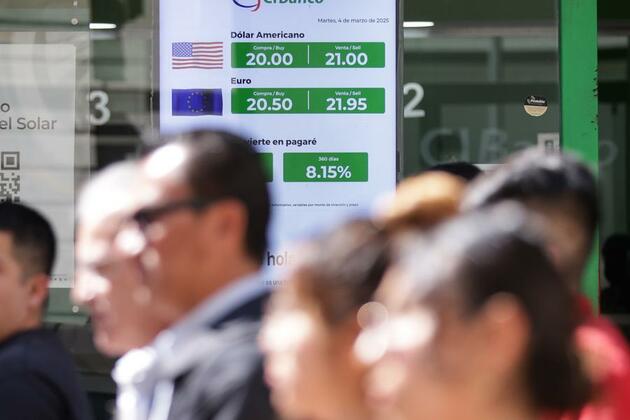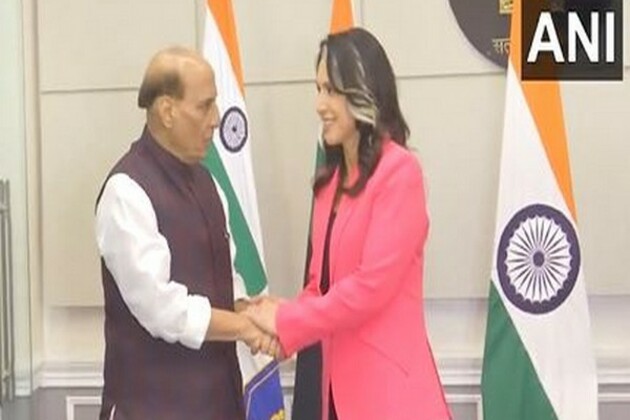World Insights: Trump's "reciprocal tariffs" heighten uncertainty for global trade, experts warn
Xinhua
17 Mar 2025, 16:16 GMT+10

Economists warned of the severe consequences for the global economy amid the uncertainty brought by Trump's tariffs.
by Xirui Li
NEW YORK, March 17 (Xinhua) -- Experts warned that U.S. President Donald Trump's proposal for "reciprocal tariffs" is adding uncertainty to international trade.
On Wednesday, the Trump administration raised global steel and aluminum tariffs to 25 percent and set an April 2 deadline for implementing reciprocal tariffs -- matching U.S. tariffs on foreign goods to the rates those countries impose on U.S. products.
This policy quickly provoked retaliation from Canada and the EU, prompting Trump to threaten a 200 percent "counter-counter tariff" on alcoholic products from the EU on Thursday.
These developments, along with Trump's recent "on-and-off" tariff policies toward Mexico and Canada, are the latest in a series of tariff measures announced by Trump under his so-called "Fair and Reciprocal Plan," a presidential memorandum he signed on Feb. 13 to address "longstanding imbalances" in global trade.
Under Trump's proposal, the United States would establish different tariff rates for different countries based on a comprehensive assessment of their trade openness.
However, many experts argue that the trade policy is undermining the global trading system, creating uncertainties for global businesses and eventually backfiring on the U.S. economy.
"A decision to unilaterally increase U.S. import tariffs, product by product, country by country, would be President Trump's biggest blow yet to the rules-based trading system," Chad Bown, a senior fellow at the Peterson Institute for International Economics, told the New York Times.
He said Trump's tariffs would violate World Trade Organization (WTO) rules in two ways: applying different tariff rates to different countries would violate a commitment by WTO members not to discriminate against one another; and if the United States raises its tariff rates beyond the maximum rate it has negotiated with other members, that would break trading rules, too.
Gary Clyde Hufbauer, a nonresident senior fellow at the Peterson Institute for International Economics, told Xinhua that "reciprocity" meant overall balance, in terms of concessions given and concessions received, between each country on the one hand and all its trading partners on the other hand, but Trump has redefined the meaning of "reciprocity" to apply on a line item basis, country by country, rather than overall balance.
Economists warned of the severe consequences for the global economy amid the uncertainty brought by Trump's tariffs.
"We're now facing a new crisis," said Bank of Canada Governor Tiff Macklem.
"Depending on the extent and duration of new U.S. tariffs, the economic impact could be severe," he added. "The uncertainty alone is already causing harm."
"If the world embarks on the path towards a trade war, this will have an extremely negative impact on the growth prospects of the global economy," European Central Bank Vice-President Luis de Guindos told Xinhua in an interview.
"Increases in tariffs and quotas are a negative supply shock, especially if accompanied by retaliation. This vicious circle should be avoided," he said.
Meanwhile, some experts warned that such moves would undermine U.S. credibility in trade negotiations and dampen its own economy.
Craig Allen, former president of the U.S.-China Business Council and now a senior counselor at the Cohen Group in Washington, D.C., noted that trade policy uncertainty is driving more outbound U.S. investment.
Highlighting the robust growth in Asian markets, Allen argued that U.S. firms seeking to benefit from this growth are being pushed to invest in these markets instead of doing trade with them due to trade barriers, hurting American workers and the broader U.S. economy.
 Share
Share
 Tweet
Tweet
 Share
Share
 Flip
Flip
 Email
Email
Watch latest videos
Subscribe and Follow
Get a daily dose of Central Asia Times news through our daily email, its complimentary and keeps you fully up to date with world and business news as well.
News RELEASES
Publish news of your business, community or sports group, personnel appointments, major event and more by submitting a news release to Central Asia Times.
More InformationInternational
SectionTrump administration pushes food firms to drop artificial dyes
NEW YORK CITY, New York: The Trump administration is pressuring major food companies to remove artificial dyes from their products,...
Lawmakers debate military expansion amid European security fears
BERLIN, Germany: German Lawmakers are debating whether to loosen the country's strict borrowing rules to fund military expansion. ...
Trump to end U.S. government international news services
The Voice of America may not live up to its ambitious name for much longer. Michael Abramowitz, the director of VOA, said in a Facebook...
Dozens dead as U.S. launches large scale offensive in Yemen
WASHINGTON, DC - U.S. President Donald Trump has joined Israel's war on Yemen's Houthis, days after the group said it would resume...
SPHEREx telescope to create a three-dimensional map of the cosmos
LOMPOC, California: NASA launched a new telescope into space this week to study the origins of the universe and search for hidden water...
Texas, New Mexico report 28 new measles cases in five days
AUSTIN/SANTA FE: Texas/New Mexico have reported 28 new measles cases in the past five days, bringing the total to 256 since the outbreak...
Asia
SectionJaguar Land Rover opts out of EV production at Tata’s India plant
NEW DELHI, India: Jaguar Land Rover (JLR) has decided against manufacturing electric vehicles at Tata Motors' upcoming $1 billion factory...
Virginia governor warns US must fast-track fusion or fall behind China
NEW YORK CITY, New York: The U.S. must accelerate its efforts to develop fusion energy or risk losing its edge to China, Virginia Governor...
China now dominates shipbuilding; US faces security risks
WASHINGTON, D.C.: In the past 20 years, China has become the world's top shipbuilder, producing more than half of all commercial ships....
China hits Canadian agriculture with tariffs in trade retaliation
BEIJING, China: China has announced new tariffs on Canadian agricultural and food products in retaliation for Canada's recent duties...
World Insights: Trump's "reciprocal tariffs" heighten uncertainty for global trade, experts warn
People walk past a sign displaying the dollar exchange rate at a bank branch in Mexico City, Mexico, on March 4, 2025. The 25-percent...
India raises issue of anti-India activities of SFJ in US during meeting with Tulsi Gabbard
New Delhi [India], March 17 (ANI): India has raised issue of anti-India activities conducted by banned Khalistani organisation Sikhs...












